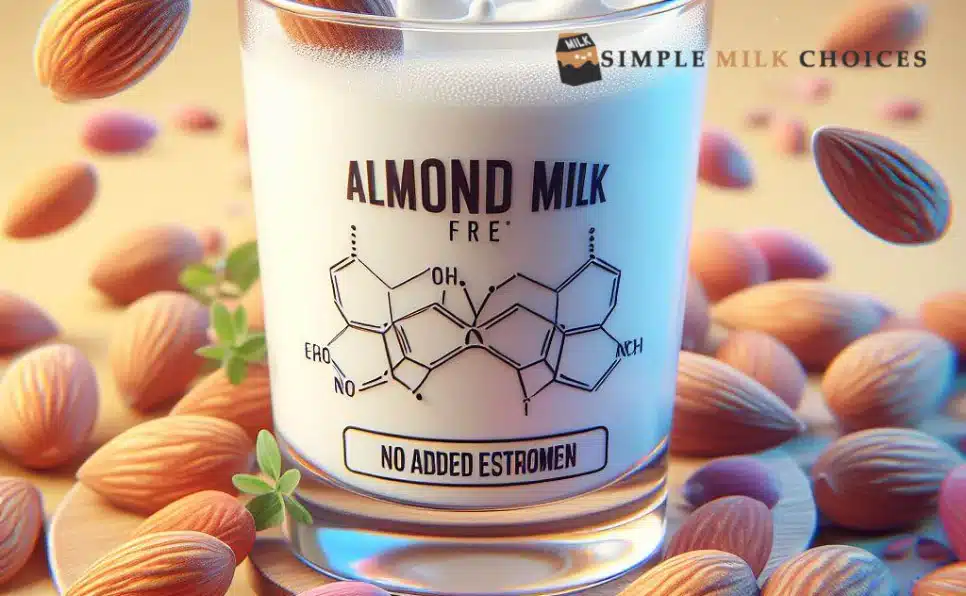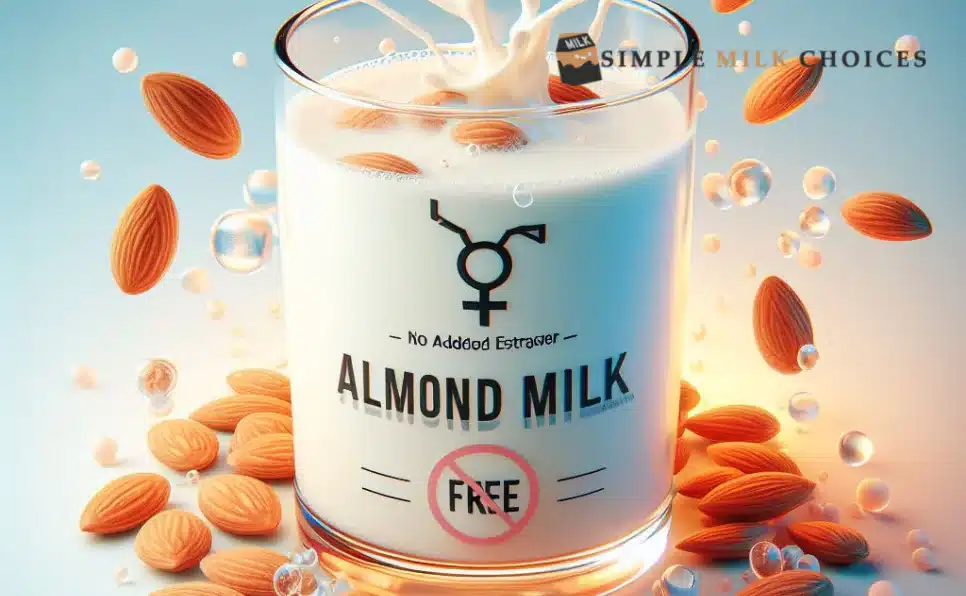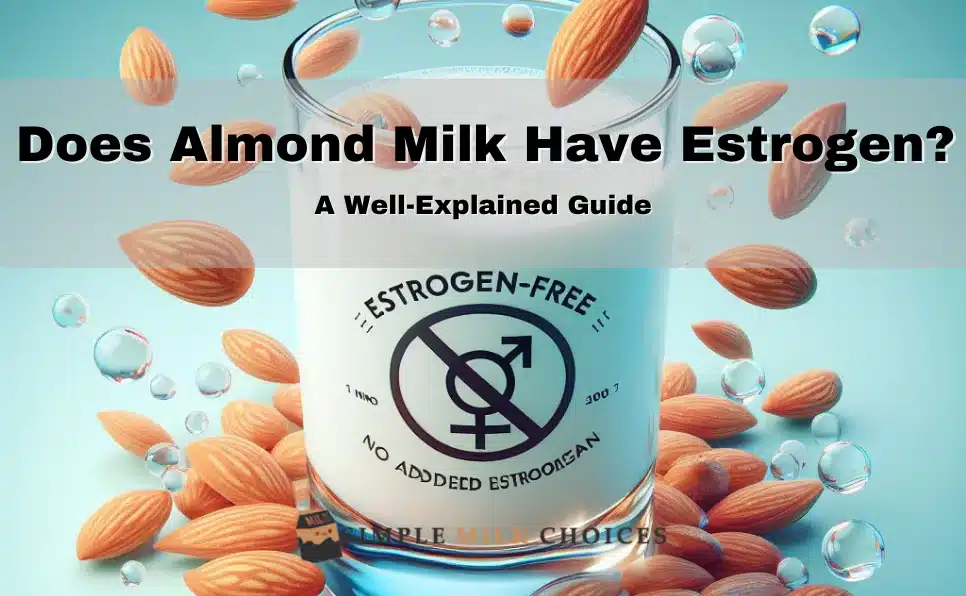Almond milk has become a staple in numerous families, loved for its velvety texture, and promoted as a solid option in contrast to dairy. Consumers have a growing concern about whether almond milk contains estrogen. This concern has sparked discussions about its health implications and potential effects on health. This complete guide will delve into the reality behind this inquiry. We’ll analyze misinterpretations and scientific discoveries to uncover whether almond milk contains estrogen and its impact on our health.
Understanding of Estrogen
Estrogen
Estrogen is like a superhuman chemical, playing many important roles within your body. It’s worth considering its significance for various bodily functions. It’s one of the principal chemicals tracked down in both young girls and young boys; however, it’s more prevalent in young girls and women.
How Does Estrogen Respond?
Estrogen wears many caps! It acts as a manager in your body, supervising various tasks:
Things that Affect
Reproduction: It’s a major part of things like periods, pregnancy, and breastfeeding. Estrogen directs the period and supports the development of body parts associated with making children.
Bone Wellness: Estrogen contributes to the health and strength of your bones. Consider it a protector for your bones, ensuring they stay strong.
Mind-set and Feelings: Estrogen, sometimes referred to as the “feel-good” hormone, can impact your emotional well-being. It has the potential to influence your internal feelings. It assumes a part in the state of mind swings and how you handle pressure.
Where Does Estrogen Come From?
Your body resembles a processing plant that makes estrogen. It’s primarily created in your ovaries (if you’re a young lady) and in more modest amounts in your adrenal organs and fat cells. Men also have estrogen, but they generally produce less of it. This happens mostly in their testicles.
Comparing Natural and Artificial Estrogen
There are two kinds of estrogen: the regular kind your body makes and the manufactured kind that is made in labs. Natural estrogen helps your body stay healthy and do its regular jobs. Artificial estrogen, as in certain drugs or synthetic substances, can once in a while mirror normal estrogen yet could act diversely in your body.
Why Does Estrogen Matter?
Among the many chemicals in your body, estrogen is a crucial component. It keeps things chugging along as expected, from your conceptual framework to your state of mind and, surprisingly, your bone health. To an extreme or too little estrogen can now and again cause issues, so everything revolves around keeping a balance on the money.
Understanding estrogen assists us with getting a handle on why it’s essential, how it works, and what it means for various parts of our bodies. It’s a central member of the mind-boggling dance of chemicals that keeps us sound and working at our best.
Does Almond Milk have Estrogen?
If you are looking for a quick answer, almond milk has stuff called phytoestrogens, which are a bit like estrogen but not the same. These things are there, but they’re usually thought to be in small amounts, so they don’t mess up our hormones a lot.

Almond Milk
What Exactly is Almond Milk?
Almond milk is a velvety fluid that is a whiz among non-dairy choices. You make almond milk by soaking almonds in water and then squeezing them to get a smooth liquid. It resembles almonds cleaning up in water and transforming it into a flavorful, nutty beverage. Now, what makes it stand apart is its flexibility. It is used in various ways in the kitchen. You can use it as a substitute for plain milk in baking and cooking.
The Most Awesome Aspect
Almond milk is a superhuman for people who can’t do dairy because of lactose narrow-mindedness or a plant-based way of life. It’s really good milk, but it’s not from cows. If you can’t have lactose, it won’t upset your stomach. It’s a companion without lactose, offering milk’s goodness minus the cow factor.
In terms of nutrition, it’s also excellent! It sneaks up suddenly with nutrients like E and D, some
calcium and healthy fats from those powerful almonds. Also, the taste? All things considered, it’s nutty, somewhat sweet, and quite smooth.
In simple terms, almond milk is a nutty mixture of two ingredients (almonds and milk). Which is the best alternative to plain milk? It is also very useful for those who are looking for a plant-based drink. This makes it a healthy force to be reckoned with.
Essential Supplements
Almond milk is abundant in essential supplements like nutrients and minerals. It frequently contains vitamin E, a strong cancer prevention agent perfect for skin health and shielding our cells from harm.
Low in Calories: Contrasted with cow’s milk, almond milk will in general be lower in calories, making it a decent decision for those watching their calorie consumption.
Sound Fats: Almonds are known for their sound fats, particularly monounsaturated fats. These fats are heart-accommodating and can help lessen terrible cholesterol levels.
Fortification: Numerous almond milk assortments are strengthened with nutrients like vitamin D and calcium, which are pivotal for bone health and, generally speaking, prosperity.
Low in Sugar (Once in a While): Some brands of almond milk make unsweetened versions that have little or no sweetness. It is very beneficial for those who do not want to eat sweets.
Lactose-Free: This milk is completely lactose-free and is an effective and best option for those who do not want to take lactose.
Protein Content: Almond milk is high in protein, but less than cow’s milk. However, a few brands sustain their almond milk to help its protein levels.
Almond milk contains normal parts called phytoestrogens from almonds. These mixtures are comparable in design to estrogen; however, they have enduring capabilities in our bodies. It’s loaded with minerals like magnesium and iron, which are critical for our general health and give us energy. When we compare almond milk to regular dairy milk, almond milk usually has less fat, which can be bad for our hearts.
Cholesterol Level: Almond milk typically lacks cholesterol, which is advantageous for heart health and maintaining healthy cholesterol levels. It’s vital to take note that not all almond milk brands offer similar medical advantages, so it is crucial to look at the names.
The Almond Milk and Estrogen Debate
The presence of estrogen in almond milk shows its health effects.
Almonds and Estrogen
Almond milk has something called phytoestrogens from almonds. They look a bit like estrogen, but they work differently in our bodies.
Understanding Phytoestrogens
These are found in various plants and act a bit like estrogen. But compared to our body’s estrogen, their impact is much smaller.
Estrogen in Almond Milk
Some of these phytoestrogens from almonds can end up in almond milk when it’s made. Incidentally, almond milk and estrogen can influence our synthetic levels.
Examination and Discoveries
Researchers have concentrated on the estrogen content in almonds and almond milk. Their exploration recommends that while phytoestrogens are available in almonds, the levels in almond milk are normally very low.
Health Tip
As far as we’ve learned, the estrogen-like things in almond milk don’t seem to mess up our body’s balance, especially if we don’t have too much of it.
Erasing Myths
These phytoestrogens, which are present in almond milk, are not as potent as our body’s natural estrogen. They’re somewhat delicate and don’t influence us the same way. Thus, concerns about almond milk producing uneven hormone profiles might be exaggerated or unfounded.
Generally, the discussion revolves around whether the limited quantities of phytoestrogens in almond milk ought to raise worries about our chemical levels. Recent studies show that almond milk contains these mixtures. However, their impact on our bodies appears to be minimal and unlikely to cause significant hormonal disruptions. Moderation remains essential to a healthy diet and overall health, just like with any other food.

Understanding Phytoestrogens and Their Function
Phytoestrogens are like nature’s reverberations of estrogen. They’re intensified and found in specific plants that look like the construction of the chemical estrogen. Phytoestrogens mimic the actions of estrogen in the body in the same way that an echo reflects a sound.
The Role They Play
These plant-based compounds are associated with our body’s estrogen receptors. At the point when they fit into these receptors, they can either imitate estrogen’s belongings or, curiously, block its activities. It’s practically like they’re sitting in similar seats as estrogen, but deciding to remain silent or behaving like a substitute.
Phytoestrogens in Each of their Varieties
Phytoestrogens come in a few key structures: Soybeans and items produced using soy, for example, tofu and soy milk, contain isoflavones.
Certain natural products, vegetables, entire grains, and seeds contain lignans. Coumestans are generally tracked down in sprouts and certain vegetables.
Their Effect on Health
Phytoestrogens stand out for their potential health impacts. A few investigations recommend that these food varieties could work like estrogen or prevent it from working. This may be great for issues impacted by chemicals, similar to menopause signs or a few sorts of tumors.
Conclusion
Almond milk’s standing as a health-conscious dairy elective converges with worries regarding its estrogen content. Through this investigation, we’ve analyzed fantasies, inspected logical proof, and expected to give a clearer comprehension of whether almond milk harbors estrogen and its possible ramifications for our health.
General Frequently Asked Questions
Q1: Is estrogen awful for our health?
A1: Estrogen is a chemical that assumes a part in our body’s capabilities, similar to development and temperament. It’s not innately terrible; however, too much or too little can at times cause medical problems. Balance is vital!
Q2: Does almond milk contain estrogen?
A2: Almonds have something many refer to as “phytoestrogens,” which are like estrogen but not exactly the equivalent. There are conversations about whether these could influence our chemicals; however, research is not yet sorting it out.
Q3: Will drinking almond milk mess up my chemicals?
A3: There’s no strong evidence that almond milk can wreck chemicals. A few examinations hint that the mixtures in almonds could behave like estrogen, but it’s not satisfactory if causing significant changes in our bodies is sufficient.
Q4: Should ladies be stressed over almond milk and estrogen?
A4: For most ladies, it is probably fine to appreciate almond milk with some restraint. Yet, for those with explicit health concerns or who are sensitive to chemical changes, it may be great to talk with a specialist.
Q5: Is almond milk preferable for hormonal balance over cow’s milk?
A5: Both have their advantages and disadvantages. Almond milk may be a decent choice for people who can’t have dairy, but its chemical consequences probably won’t be as incomprehensible as cow’s milk.
Q6: Are there any other drinks or foods that alter hormone levels?
A6: Indeed, numerous food varieties have intensified that can collaborate with our chemicals, similar to soy or flaxseed. It’s about balance and assortment in our eating regimens!





